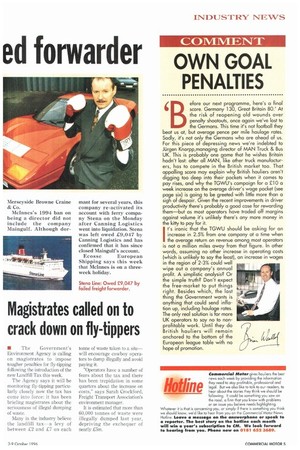OWN GOAL PENALTIES
Page 7

If you've noticed an error in this article please click here to report it so we can fix it.
4 efore our next programme, here's a final
score. Germany 130, Great Britain 80.' At the risk of reopening old wounds over penalty shootouts, once again we've lost to the Germans. This time it's not football they beat us at, but average pence per mile haulage rates. Sadly, it's not only the Germans who are ahead of us. For this piece of depressing news we're indebted to Jiirgen Knorpp,managing director of MAN Truck & Bus UK. This is probably one game that he wishes Britain hadn't lost: after all MAN, like other truck manufacturers, has to compete in the British market too. That appalling score may explain why British hauliers aren't digging too deep into their pockets when it comes to pay rises, and why the TGWU's campaign for a 210 a week increase on the average driver's wage packet (see page six) is going to be greeted with little more than a sigh of despair. Given the recent improvements in driver productivity there's probably a good case for rewarding them—but as most operators have traded off margins against volume it's unlikely there's any more money in the kitty to pay for it.
It's ironic that the TGWU should be asking for an increase in 2.5% from one company at a time when the average return on revenue among most operators is not a million miles away from that figure. In other words, assuming no other increase in operating costs (which is unlikely to say the least), an increase in wages
in the region of 2-3% could well wipe out a company's annual profit. A simplistic analysis? Or the simple truth? Don't expect the free-market to put things right. Besides which, the last thing the Government wants is anything that could send inflation up, including haulage rates. The only real solution is for more UK operators to say no to nonprofitable work. Until they do British hauliers will remain anchored to the bottom of the European league table with no hope of promotion.








































































































